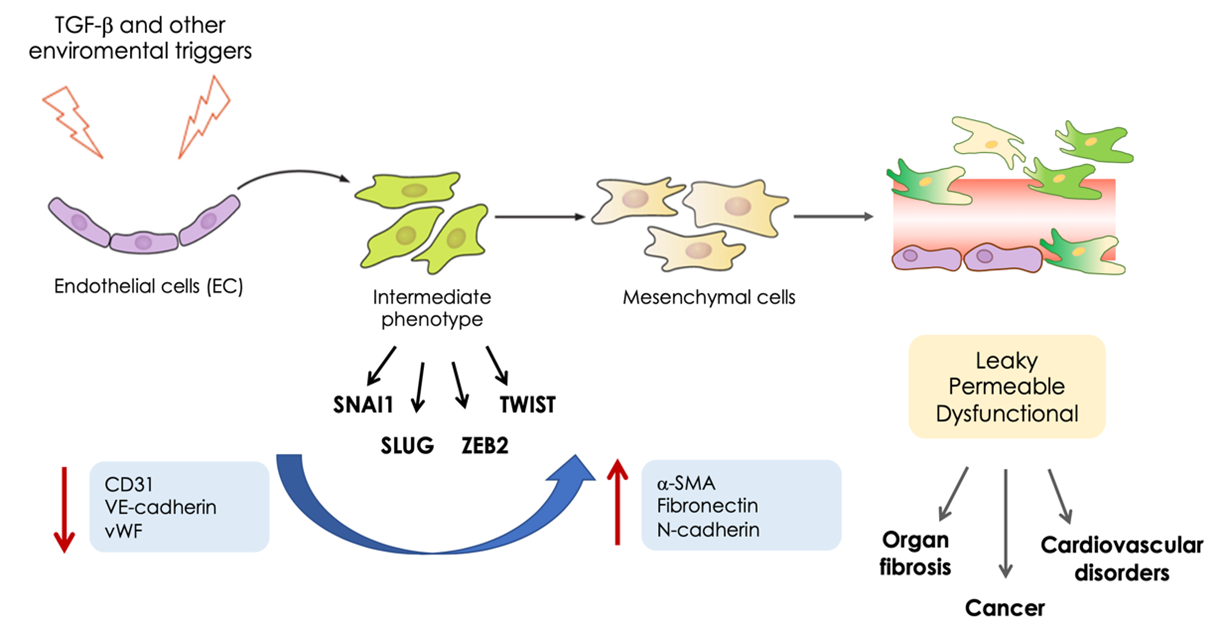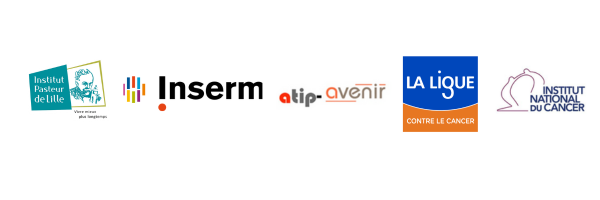Role of Endothelial Cells (EC) plasticity and metabolic reprogramming in diseases (Atip-Avenir)
INSERM U1011 – Université de Lille – CHU Lille – Institut Pasteur de Lille

Team presentation
The endothelium plays an indispensable role in all tissues, and its dysfunction contributes to a variety of cardiovascular disorders, including atherosclerosis, as well as cancer. Therefore, targeting dysfunctional blood vessels represents a promising avenue for the development of therapies aimed at preventing or treating the most prevalent diseases.
Our research aims at characterizing the role of endothelial cell dysfunction in the onset of cardiovascular diseases and cancer. Specifically, we focus on endothelial cell plasticity and associated metabolic reprogramming as drivers of disease progression.
By combining multidisciplinary expertise and using advanced molecular and cellular approaches, as well as in vivo mouse models, our team strives to decipher the complex mechanisms regulating the pathological transdifferentation of endothelial cells into mesenchymal-like cells (endothelial-to-mesenchymal transition, EndMT) with the ultimate goal to identify novel means to target this process. Our work is part of a translational approach aiming, in the long-term, at translating our discoveries into clinical applications to improve the care of patients suffering from cardiovascular diseases and cancer.

EndMT process: Following environmental stimuli, ECs progressively loose their identity by downregulating the canonical endothelial markers (CD31, VE-cadherin, vWF) and acquiring the expression of mesenchymal markers (a-SMA, fibronectin, N-cadherin) and transcription factors (SNAI1, SLUG, ZEB2, TWIST) leading to dysfunctional vessels.
Projects
 PROJECT 1 (Louay BETTAIEB; Alina ERRERD) – Fundings : Université de Lille ; Erasmus+ / Inserm
PROJECT 1 (Louay BETTAIEB; Alina ERRERD) – Fundings : Université de Lille ; Erasmus+ / Inserm
A novel anti-angiogenic strategy targeting dysfunctional AIF/CHCHD4 pathway
(Collaboration : Dr Fabrice SONCIN, LiMMS/IIS, Lille ; Dr Nazanine MODJTAHEDI, UMR CNRS 5261 – INSERM U1315 – Université Claude Bernard Lyon)
Mitochondria are the powerhouse of the cells and to function correctly they must import their proteome via an import machinery pathway, the core component of which is the oxidoreductase CHCHD4. This latter catalyzes the oxidative folding of proteins implicated in many cellular functions including the regulation of mitochondrial metabolism, therefore any alteration of this pathway is associated with cellular dysfunction and ultimately disease.
This project focuses on the characterization of CHCHD4 pathway in endothelial cells. CHCHD4 targeting negatively impacts key cellular functions, as well as mitochondrial metabolism, leading to blood vessels abnormalities. The results obtained until now depict CHCHD4 as an important regulator of EC physiology and homeostasis. Assessing the role of this pathway in ECs will contribute to identify novel mechanisms which are altered and can be target in dysfunctional blood vessels.
 PROJECT 2 (Amani MACHMOUCHI ; Fabiola SILVA ANGULO) – Fundings : Université de Lille
PROJECT 2 (Amani MACHMOUCHI ; Fabiola SILVA ANGULO) – Fundings : Université de Lille
Uncovering gene signatures of endothelial-to-mesenchymal transition in pathological angiogenesis
(Collaboration: Pr Dimitra GKIKA, CANTHER, Lille)
This project aims to characterize the role of endothelial-mesenchymal transition (EndMT) in pathologies such as cancer and atherosclerosis. In previous studies we identified calcium signaling as a driver of physiological EndMT, with this project we extend our investigations to pathological EndMT in order to identify EndMT gene signatures associated with disease. We use advanced omics approaches combined with in vitro and in vivo models to assess the possibility of targeting calcium signaling to inhibit EndMT. This research may open new therapeutic avenues for pathologies associated with EndMT.
 PROJECT 3 (Evan COURMONT) – Fundings : Région HdF-Pasteur
PROJECT 3 (Evan COURMONT) – Fundings : Région HdF-Pasteur
The role of nuclear receptors in endothelial cell function
(Collaboration: Pr Dimitra GKIKA, CANTHER, Lille)
Nuclear receptors (NR) are a family of ligand-regulated transcription factors activated by lipid-soluble signals. Once activated, NR control the transcription of genes involved in a variety of biological processes, including proliferation, differentiation and metabolism.
The vasculature is the interface between blood circulation and underlying tissue, and as such is exposed to several NR activators. Despite evidences highlighting the role of NR in vascular biology, we still have limited knowledge on the action mechanisms in cells of vascular origin.
The aim of this project is to developed a NR atlas of human endothelial cells to identify potential candidate receptors that may play a role in vascular stability.
 PROJECT 4 (Mauro VEDELAGO; Cyril ROBIL) – Fundings : INCa-DGOS
PROJECT 4 (Mauro VEDELAGO; Cyril ROBIL) – Fundings : INCa-DGOS
Dissecting metabolic heterogeneity to increase immunotherapy
(Collaboration: Pr Guillaume PIESSEN, CHU Lille)
Metabolic heterogeneity is a crucial determinant of tissue function and, in many diseases, it is responsible of therapy failure. This is the case of tumors, where different cells in the microenvironment engage in metabolic crosstalk with other stromal cells (for example, between endothelial cells and fibroblasts) and/or immune cells to acquire a dysfunctional phenotype contributing to disease progression and anti-cancer therapy resistance. We aim to dissect the metabolic heterogeneity within highly aggressive and resistant esophageal cancer. Through a translational approach using human tissues and cutting-edge technologies, including omics, we will assess how metabolic heterogeneity among different cell populations contributes to mechanisms associated with resistance to immune checkpoint inhibitors. The ultimate goal is to identify novel metabolic targets in endothelial cells that can be exploited to improve the overall survival of esophageal cancer patients and overcome current therapeutic limitations.
Transversal Projects
 Target endothelial plasticity to inhibit acute leukemia progression and resistance
Target endothelial plasticity to inhibit acute leukemia progression and resistance
(Collaboration : Dr Diana PASSARO, Institut Cochin, Paris; Dr Leïla PERIE’, Curie Institute, Paris – Financeur : La Ligue Contre Le Cancer)
 Effects of ionophorous antibiotics on endothelial cell functions
Effects of ionophorous antibiotics on endothelial cell functions
(Collaboration : Pr Luigi LANZA, University of Padua, Italy)
Fundings

Members
COURMONT Evan
PhD student
evan.courmont.etu@univ-lille.fr
(cotutelle Pr Dimitra Gkika, CANTHER)
SILVA ANGULO Fabiola
Post-doctoral Researcher
fabiola.silva@pasteur-lille.fr
Alumnis
Ingénieur d’étude
CHAMLALI Mohamed
Post-doctoral researcher
Key Publications
Integrated single-cell RNA-seq analysis reveals mitochondrial calcium signaling as a modulator of endothelial-to-mesenchymal transition
Sci Adv. 2024 Aug 9;10(32)
TRPM8-Rap1A Interaction Sites as Critical Determinants for Adhesion and Migration of Prostate and Other Epithelial
Cancer Cells. Cancers (Basel). 2022 Apr 30;14(9):2261.
Role of the GLUT1 Glucose Transporter in Postnatal CNS Angiogenesis and Blood-Brain Barrier Integrity.
Circ Res. 2020 Jul 31;127(4):466-482.
The Two-Way Relationship Between Calcium and Metabolism in Cancer
Cell Dev. Biol., 2020 Nov 13;8:573747.
Eelen G*, Dubois C*, Cantelmo AR, Goveia J, Brüning U, DeRan M, Jarugumilli G, van Rijssel J, Saladino G, Comitani F, Zecchin A, Rocha S, Chen R, Huang H, Vandekeere S, Kalucka J, Lange C, Morales-Rodriguez F, Cruys B, Treps L, Ramer L, Vinckier S, Brepoels K, Wyns S, Souffreau J, Schoonjans L, Lamers WH, Wu Y, Haustraete J, Hofkens J, Liekens S, Cubbon R, Ghesquière B, Dewerchin M, Gervasio FL, Li X, van Buul JD, Wu X, Carmeliet P. *equal contribution
Role of glutamine synthetase in angiogenesis beyond glutamine synthesis.
Nature. 2018 Sep;561(7721):63-69.
Tumor vessel disintegration by maximum tolerable PFKFB3 blockade.
Angiogenesis. 2017 Nov;20(4):599-613.
Inhibition of the glycolytic activator PFKFB3 in endothelial cells induces tumor vessel normalization, impairs metastasis and improves chemotherapy
Cancer Cell. 2016 Dec 12;30(6):968-985.
Keywords
Contact of the team
Anna Rita CANTELMO
Team Leader
ORCID :
0000-0002-2748-264X
anna-rita.cantelmo@univ-lille.fr
+33 3 20 87 71 48
